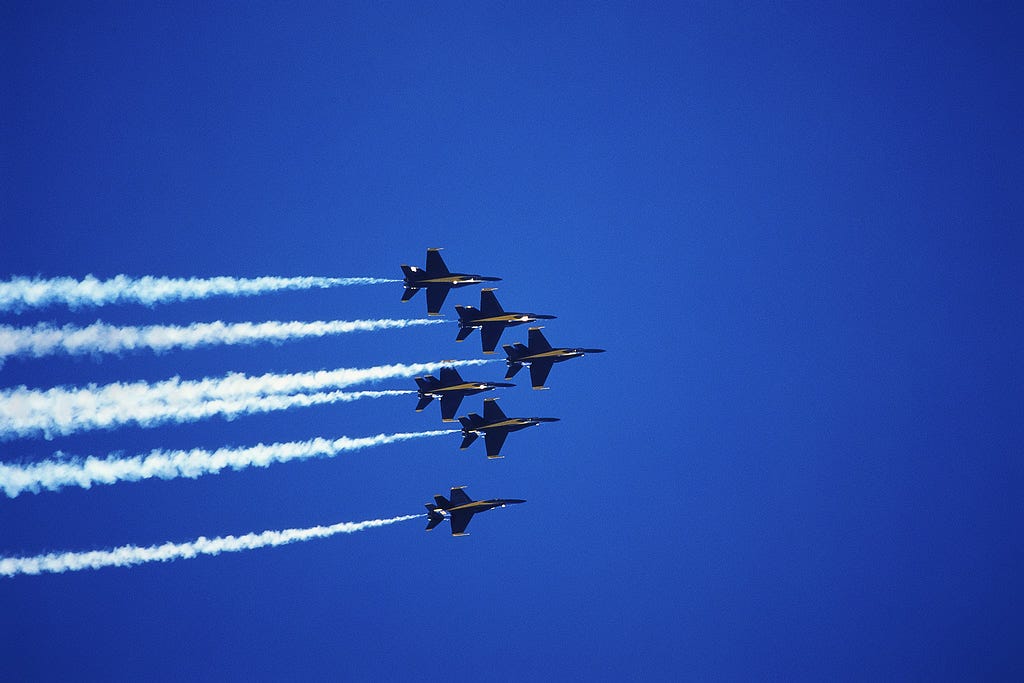"Winning Is the Only Option" - Essential Lessons from Our History
The necessity of leadership at the highest level
Some of you will recall a marvelous guest essay by Mike Kaye that he allowed me to post here last April. For those of you who have not seen it, take a look at it here. Mike has graciously allowed to post another, which is below (with one slight non-substantive edit).
Mike is an accomplished author, the founder of a youth sports ministry called Stewards of the Game, and also is, among other things, the Head Basketball Coach at the Community School of Davidson in Davidson, NC. Take a few minutes and read his thoughts upon watching an air show in England. It will prompt your thinking about his broader message encapsulated in my title above. If you like it (you will!), take a look at his blog for more.
Air show – How do they do that?
Today I went to my first air show. All kinds of planes, old and new, single engine and jets. I tried to video their aerobatics with my iPhone, which was a silly thing to try to do. The air show was at the Duxford Air Museum in England. A huge air base dedicated to the RAF and the United States Army Air Force operations in WWII. A fascinating place, way too much to see and learn in a one-day visit. Two historians served as guides on our excursion, and both were informative. One of them, named Bob, a Brit, made a comment that was quite intriguing. As he explained, there continues to be an ongoing debate between the branches of the military – Army, Navy, and Air Force, regarding which deserves the lion share of credit for winning the war.
Throughout the war, there were internal battles between the armed services for resources, and fierce arguments over military and political strategy and priorities. It seems only natural that they would argue about their relative roles in achieving ultimate victory. There is immense pride in the allied countries who were victorious in WWII, not just within the military but ingrained in the culture as well. But how long will this pride last? Is it already receding within the younger generations, who know less and less about this historic event? If so, what does it foretell for our country?
The more I study WWII, the more I am convinced that it is overflowing with important lessons that should be taught to and learned by every generation. There is no other event in modern history that comes close to having the lasting impact of WWII. More people fought and died, including military combatants and civilians than in any war in history. The breadth and scale of this global conflict was unprecedented and has never been equaled since.
In my mind, at least, it begs the question – What would the world be like today if the Allies had lost? In other words, for what major purpose were the Allies fighting? Approximately 16 million Americans served in WWII and over 416,000 died. They were all courageous, patriotic, and have certainly earned the moniker – The Greatest Generation. But how does or how should America, particularly the younger generations, think about WWII today? Do they understand the significance of the victory that shaped the world for the next eighty years?
Back to the first question…. If Germany’s war strategy was determined by its Generals instead of Adolf Hitler, the war may have turned out very differently. If the American cryptologists, led by Joe Rochefort failed to crack the Japanese codes, we might not have won the Battle of Midway, which turned the tide in the Pacific. Victory was not a guarantee, and it was fought for and won due to the efforts and sacrifices of millions of Allied soldiers, support troops, government officials, and citizens back home. It was a fight for freedom unlike anything the world has ever known, before or since.
Winning was the only option. How can we expect the younger generations to understand this if they don’t learn the essential lessons from the war? In my view it is important that they do. Why?
If we take our freedom for granted, we are at greater risk of losing it. If we don’t play a leadership role in the world and work toward preserving peace, prosperity, and freedom throughout the world, all three could be fleeting. Meanwhile, there seems to be a growing concern about our military readiness in a world that is becoming less safe. These are unsettling trends and require serious discussion by experts at the highest level. Do we have confidence in our Commander in Chief to face any future military threat? I sure don’t.
For citizens to be proud of their country, the country has to accomplish something extraordinary, and it has to aspire to comprehensive greatness. What is that exactly?
It requires leadership at the highest level. Economically, politically, culturally, and morally. Where today are we falling short of being our very best as a nation? What and who can help us to be better? Questions to ponder, perhaps. Discuss and debate would be even better. A lot is at stake, and we should not take anything we cherish for granted.
Please help me grow my readership by forwarding this to a friend(s). In the meantime, say tuned for my next newsletter. Thanks
Michael Kayes
* * * *
Thanks to all for reading and subscribing. Don’t neglect checking out Mike’s Blog.




